The Environment and Christian Responsibility
Monday, 17 July 2006
Tyger Tyger burning bright,
In the forests of the night;
What immortal hand or eye,
Could frame thy fearful symmetry?
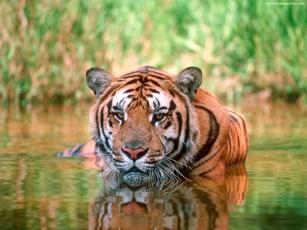 In what distant deeps or skies,
Burnt the fire of thine eyes?
On what wings dare he aspire?
What the hand dare seize the fire?
In what distant deeps or skies,
Burnt the fire of thine eyes?
On what wings dare he aspire?
What the hand dare seize the fire?
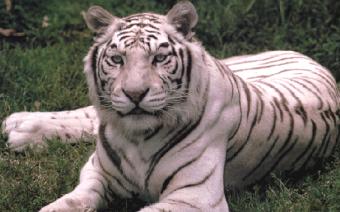 And what shoulder & what art,
Could twist the sinews of thy heart?
And when thy heart began to beat,
What dread hand? & what dread feet?
And what shoulder & what art,
Could twist the sinews of thy heart?
And when thy heart began to beat,
What dread hand? & what dread feet?
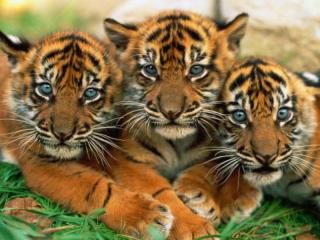 What the hammer? What the chain?
In what furnace was thy brain?
What the anvil? What dread grasp
Dare its deadly terrors clasp!
What the hammer? What the chain?
In what furnace was thy brain?
What the anvil? What dread grasp
Dare its deadly terrors clasp!
 When the stars threw down their spears
And water'd heaven with their tears:
Did he smile his work to see?
Did he who made the lamb make thee?
When the stars threw down their spears
And water'd heaven with their tears:
Did he smile his work to see?
Did he who made the lamb make thee?
 Tyger Tyger burning bright,
In the forests of the night:
What immortal hand or eye,
Dare frame thy fearful symmetry?
Tyger Tyger burning bright,
In the forests of the night:
What immortal hand or eye,
Dare frame thy fearful symmetry?
There is something magical, mysterious, even marvelous about the tiger,
as William Blake's 1794 poem indicates. The tiger is a perfect alpha
predator, able to leap ten meters from a standing position, a ferocious
killer. The largest of all the cats, it is both feared for its strength
and revered for its beauty. Despite its prowess as a hunter, or perhaps
because of it, the tiger has been brought to the brink of extinction by
its only enemy, humankind. Three of eight tiger subspecies have
disappeared in the last century (the Bali tiger in the 1940s, the Caspian
tiger in the 1970s, and the Javan tiger in the 1980s), and only between
5,000 and 7,000 tigers remain in the wild, hunted for their hides and
their organs, which are used in traditional medicines.
Why is the fate of the tiger an appropriate topic for Christian
reflection? The tiger reflects God's ingenuity and aesthetic sensitivity.
It is a fearsome, beautiful animal that humans may hunt to extinction
within a few decades. Some people, including Christians, think that
humans have the right to do whatever they want to do to the planet, but in
doing so, they misunderstand Gen 1:28:
God blessed them, and God said to them, "Be fruitful and
multiply, and fill the earth and subdue it; and have dominion over the
fish of the sea and over the birds of the air and over every living thing
that moves upon the earth."
The Hebrew word for "subdue" can have violent overtones (rape), but
parallelism with "have dominion" softens the meaning in this context.
Some scholars believe that the root meaning of the second word is "to
wander about, as a shepherd guiding his sheep." If that is true, then the
emphasis of this verse is that the world is not to be violated but rather
used for the benefit of all. The Septuagint (Old Greek) translation uses
a verbal form related to the noun usually translated "Lord," suggesting
that human beings are to treat the planet as though they were
representatives of the Lord, that is, with care, concern, and wisdom.
The extinction of the tiger would clearly be a great loss to the world,
but is the same true of the ivory-billed woodpecker, the California
condor, or the quagga (the last already extinct)?
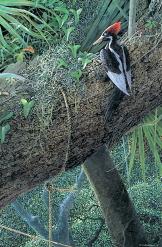

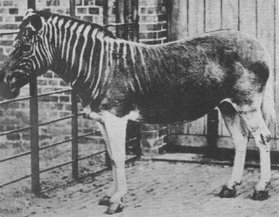
Let's look at Psalm 148.
1 Praise the Lord!
Praise the Lord from the heavens;
praise him in the heights!
2 Praise him, all his angels;
praise him, all his host!
3 Praise him, sun and moon;
praise him, all you shining stars!
4 Praise him, you highest heavens,
and you waters above the heavens!
5 Let them praise the name of the Lord,
for he commanded and they were created.
6 He established them forever and ever;
he fixed their bounds, which cannot be passed.
7 Praise the Lord from the earth,
you sea monsters and all deeps,
8 fire and hail, snow and frost,
stormy wind fulfilling his command!
9 Mountains and all hills,
fruit trees and all cedars!
10 Wild animals and all cattle,
creeping things and flying birds!
11 Kings of the earth and all peoples,
princes and all rulers of the earth!
12 Young men and women alike,
old and young together!
13 Let them praise the name of the Lord,
for his name alone is exalted;
his glory is above earth and heaven.
14 He has raised up a horn for his people,
praise for all his faithful,
for the people of Israel who are close to him.
Praise the Lord!
Unlike many psalms of praise, this one says little about the reasons
for praising God: the psalmist assumes that the worshiper already knows
reasons to praise God. Instead, what he focuses on is the matter of
who should praise God. Praise begins in the heavens with the
angelic beings, and it moves to the sun, moon, and stars. Even the waters
above the heavens are called to praise God. From there, the psalmist moves
to the earth, calling on the powers of fire, hail, snow, and frost to
praise God, alongside the sea monsters of the deep. Then it is the turn of
the mountains and hills, fruit trees and cedars, wild and domesticated
animals, creeping things (reptiles and amphibians) and birds. Finally,
after all the inanimate and all other animate beings have had their chance
to praise God, the psalmist turns to humans beings. Both rulers and
ordinary people are called on to praise God, men and women, old and young.
I find this psalm fascinating, because, like several others, it calls upon
physical objects and all kinds of animals to praise God. It raises the
question, how can the stars, or snow, or a whale, or a cedar tree, or a
horse, or a Komodo dragon praise God? This is not an idle question, for it
is central to our understanding of a theology of creation.

Although it is a question that is much too big to answer in the short
time we have together this morning, let me suggest some ways in which we
might think about the meaning of creation's praise of the Creator. Before
we can proceed with examining how different types of animate and inanimate
beings can praise God, we first have to define praise in this context. If
praise in a human context means attributing value to a worthy God, then we
can think of non-human praise as ways in which creation points to the
goodness and wisdom of God. For example, if we believe that God's will
lies behind the organizational structure of the universe, then objects
like the sun, moon, and stars "praise" God by revealing to both casual
observers and dedicated astronomers the intricacies of the created order,
from the universe itself--or what we can observe of it or theorize about
it--to the tiniest subatomic particle, and from the Big Bang to the end of
the universe as we project it. Snow and hail and rain praise God by
revealing the divine goodness in providing the fresh water that humans,
animals, and plants alike need for survival. Even such destructive forces
as hurricanes and earthquakes praise God in the sense that they remind us
that the world has mechanisms that are designed to renew and recycle the
resources that God has given us. Ecologists know that periodic hurricanes,
in an era before human encroachment on the sea coasts, renewed coastlands
and wetlands, just as naturally occurring forest fires are part of the
natural cycle of life in the woodlands. Similarly, earthquakes are part of
the natural movement of tectonic plates, which results in mountain
building, continental drift, long-term climate change, and ultimately in
recycling the earth's crust.
Plants and animals praise God by being exactly what they are: organisms
that rely on the sun and each other for energy to survive and multiply.
Their complexity of internal structure and external interaction with other
species in the web of life reveals the brilliant mind of God. A corollary
of this observation is that when humans exterminate a species, either
directly, as in the hunting to extinction of the quagga, or indirectly, as
in the habitat destruction that has driven wild tigers, California
condors, and ivory-billed woodpeckers to the brink of extinction, we are
diminishing the chorus of living beings that give praise to God. Although
we started with a definition of praise derived from human interaction with
the divine and moved into a discussion of non-human praise, we can now
move the other direction and ask ourselves what we humans can learn about
praise from the rest of God's creation. Probably we can learn many things,
but one lesson stands out for me. We tend to view praise as something that
is exclusively verbal--whether spoken, sung, or thought--but our inquiry
into non-human praise has shown us that created beings without the
capability of language are able to praise God without any problem.
Therefore, I would suggest that human praise, like non-human praise,
should be defined primarily as ways in which we humans can point to the
goodness and wisdom of God. We can do so by caring for God's creation, by
loving our neighbors, and by leaving the world a better place than we
found it. In short, we should live lives of praise to God, and in that
endeavor, we should remember that our words of praise are merely
icing on the cake.
In addition to extinctions, what other issues related to the
environment should be of importance to Christians? Here is a partial
list.
- global warming, which leads to the melting of the polar ice
caps, the submersion of the island nation of Tuvalu, the spread of dengue
fever and malaria, and the destruction of polar bear habitat
- pollution of air and water, as well as noise pollution and
light pollution
- deforestation, the destruction of topical rainforests,
temperate forests, extinctions, soil erosion, and mudslides
- loss of biodiversity, which results in crops becoming
increasingly susceptible to new diseases
What is our responsibility as Christians in regard to the environment?
The short answer is this: we are to care for the earth as God's
representatives. Here are some practical things that everyone can do:
- recycle
- pick up litter in your community
- conserve energy (by buying more energy-efficient cars, modifying your
heating/cooling habits, car pooling)
- donate to worthy environmental causes
- educate your family and friends about the environment
- support public officials with responsible environmental records and plans
- speak out on environmental matters
- learn more about important environmental issues
- lead your church through a biblical, theological study on Christians
and the environment
- celebrate Earth Day every April
- lower your ecological footprint (i.e., your impact on the environment)
- learn about one critically endangered plant or animal in your area (in
my area, this includes the Texas blind salamander, Leon Springs
salamander, Helotes mold beetle, Government Canyon cave spider, whooping
crane, and Mexican long-nosed bat--see the IUCN Red List of Threatened Species
for other examples)
Let me end with another word about extinction. The loss of any species
is a permanent loss from the created order. It diminishes the beauty of
the earth, the glory of creation, and the enjoyment of humanity. On
September 7, 1936, the last thylacine on earth died in the Hobart,
Tasmania, zoo. Also known as the Tasmanian tiger, like this old video, its voice is forever silent. What species
is next? What will we do to preserve the great chorus of creation
praising God?
This article is a version of an address delivered
in chapel at the Baptist University of the Américas in February
2006.
© Copyright 2006, Progressive
TheologyProgressive Theology
 In what distant deeps or skies,
Burnt the fire of thine eyes?
On what wings dare he aspire?
What the hand dare seize the fire?
In what distant deeps or skies,
Burnt the fire of thine eyes?
On what wings dare he aspire?
What the hand dare seize the fire?
 And what shoulder & what art,
Could twist the sinews of thy heart?
And when thy heart began to beat,
What dread hand? & what dread feet?
And what shoulder & what art,
Could twist the sinews of thy heart?
And when thy heart began to beat,
What dread hand? & what dread feet?
 What the hammer? What the chain?
In what furnace was thy brain?
What the anvil? What dread grasp
Dare its deadly terrors clasp!
What the hammer? What the chain?
In what furnace was thy brain?
What the anvil? What dread grasp
Dare its deadly terrors clasp!
 When the stars threw down their spears
And water'd heaven with their tears:
Did he smile his work to see?
Did he who made the lamb make thee?
When the stars threw down their spears
And water'd heaven with their tears:
Did he smile his work to see?
Did he who made the lamb make thee?
 Tyger Tyger burning bright,
In the forests of the night:
What immortal hand or eye,
Dare frame thy fearful symmetry?
Tyger Tyger burning bright,
In the forests of the night:
What immortal hand or eye,
Dare frame thy fearful symmetry?



